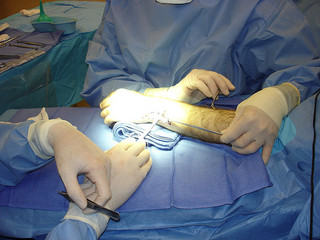Tendons are very important tissues in your body that bind your larger muscles to your bones. Because tendons play a key role in moving your bones and body as you use your muscles, they are some of the toughest tissue in your body, able to withstand great amounts of weight and stress (ligaments, which attach bone to bone, operate in similar conditions). However, despite tendon durability, extreme stress or unexpected force can still damage tendons – sometimes severely.
While rest is a common cure for tendon problems, in the most severe cases doctors perform surgery to repair the tendon. When making a decision about surgery, several factors may indicate that it is time for a more drastic response:
Ruptured or Snapped Tendons
Ruptured or snapped tendons are a sign of a serious medical injury that needs immediate attention. Sometimes tendons can be stretched or inflamed following injury, but if the force was too much, the tendon will actually rip apart. This leads to a rupture or a full snap. The two differ in how the tendon reacts, but the end result is unpleasant: The tendon typically loses most or all of its capabilities. In order to prevent the worst incapacitation, surgery is often suggested to attempt a repair. These injuries tend to occur during extreme sports and intense jobs.
Damage to an Important or Sensitive Tendon
Surgery options have evolved around several commonly damaged tendons. Hurting one of these important or delicate tendons makes surgery more likely, simply because more surgeons are familiar with the procedure. At the top of the list are Achilles’ Tendon injuries, which make it very difficult to walk, and rotator cuff injuries, one of the most common tendon issues in the world.
Severe Accidents and Nerve Injuries
In the case of a severe accident or a neurological problem, you may suffer from nerve damage. If nerves cannot be repaired, you may lose the ability to move certain parts of your body – such as your fingers or back. . The solution to this problem is sometimes a tendon transfer. In this surgery, the entire tendon section gently cut away from the bone and attached in a different area. Ideally, after healing the nerves operating the tendon will be able to fire correctly again and provide at least some control. This type of surgery is unique because the tendon itself may not be hurt even when the operation is necessary.
Inflammation That Won’t Go Away
Tendon inflammation frequently occurs in response to the injury. It is the sign that the tendon has been damaged and needs to be healed. Usually the inflammation is treated with traditional methods like rest, ice and pain relievers. But sometimes inflammation will not go away even after many days of treatment. In this case the next option is usually surgery. The inflammation may be indicating a long-term problem, like a mild rupture or tear, that needs to be solved with more drastic means.
A Demanding Schedule
Your schedule or job may also influence the likelihood of surgery. In some cases a surgery may allow the tendon to heal faster and restore functionality in a shorter amount of time. If your job is particularly demanding or there is intense pressure to return to work, a surgery may prove a more attractive option. This is more common in professional sports and similar industries.
A Doctor’s Advice
Ultimately, the best sign that you need tendon surgery is a doctor’s recommendation. Doctors examine a wide variety of individual statistics, including your current health, health history, age, and the state of the injury. This allows them to form accurate opinions. If a doctor says that you need tendon surgery, it is time to seriously consider this option.
Jessie Flesner is a freelance writer in New Albany, Indiana. She writes for www.SurgicalTools.com about a wide variety of health care industry issues.
[toggle title=”Featured images”]
[/toggle]


I used to play rugby. Broken bones and other injuries were common place, and the mentality was that if you couldn’t handle the pain, you should get out of the game. For days I’d a sore knee, and the coach spotted me favouring it during a practice. He called me over and ask what the problem was. I said it was nothing. He replied, “Nothing doesn’t usually cause a limp.” He followed with a line I have never forgotten. “Pain is natures way of telling us something is wrong.” I was taken to a clinic and sure enough I had torn a tendon in my knee and assured by the doctor it would have only gotten worse if I continued to play.